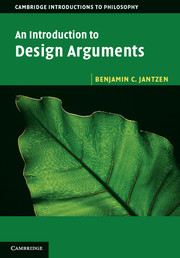Book contents
- Frontmatter
- Dedication
- Contents
- List of figures and tables
- Preface
- 1 Introduction
- 2 Preliminaries
- 3 Arguments from antiquity
- 4 Medieval arguments
- 5 The golden age of natural theology
- 6 Unusual design arguments
- 7 Hume
- 8 Paley
- 9 Darwin
- 10 Loose ends
- 11 The modern likelihood argument
- 12 Intelligent design I: irreducible complexity
- 13 Intelligent design II: specified complexity
- 14 What is complexity?
- 15 Supernatural agents and the role of laws
- 16 A brief survey of physical law
- 17 Fine tuning I: positive arguments
- 18 Fine tuning II: objections
- 19 Conclusion
- Bibliography
- Index
15 - Supernatural agents and the role of laws
Published online by Cambridge University Press: 05 June 2014
- Frontmatter
- Dedication
- Contents
- List of figures and tables
- Preface
- 1 Introduction
- 2 Preliminaries
- 3 Arguments from antiquity
- 4 Medieval arguments
- 5 The golden age of natural theology
- 6 Unusual design arguments
- 7 Hume
- 8 Paley
- 9 Darwin
- 10 Loose ends
- 11 The modern likelihood argument
- 12 Intelligent design I: irreducible complexity
- 13 Intelligent design II: specified complexity
- 14 What is complexity?
- 15 Supernatural agents and the role of laws
- 16 A brief survey of physical law
- 17 Fine tuning I: positive arguments
- 18 Fine tuning II: objections
- 19 Conclusion
- Bibliography
- Index
Summary
Two questions
To this point in our survey of design arguments, we have been primarily concerned with proving that there exists a non-human designer of part or of the entirety of the universe. We have mostly considered the properties of the designer as a peripheral question to be answered after determining its existence. However, we are interested in the existence of God (or gods), not merely the existence of non-human designers, and God is supposed to be a supernatural agent. Often He is asserted to be omnipotent, omniscient, and perfectly good. In this chapter, we explicitly take up the question of whether and how one can infer the existence of a supernatural designer on the basis of empirical evidence. This, then, is the first question we want to focus on: can we infer supernatural agency? We’ll consider one proposal for answering in the affirmative. Perhaps not surprisingly, the laws of nature figure prominently in the proposal, as they have in other design arguments we’ve considered. Here again is a central concern for natural theology to which we’ve paid only passing attention: what role do laws of nature play in design inferences? This is the second question that will engage us in this chapter.
A new vocabulary
In his book Nature, Design, and Science, Del Ratzsch attempts to provide some of the “foundational philosophical work essential for [the design debate] to make real progress.” Specifically, he sets out to clarify the concepts of ‘design’, ‘pattern’, and ‘artifact’ as well as the nature of mundane inferences to the existence of ‘finite’ designers. Lessons learned from the case of finite designers – especially human beings – are then used as a basis for showing how one might construct a strong inference to the existence of a supernatural designer.
- Type
- Chapter
- Information
- An Introduction to Design Arguments , pp. 240 - 258Publisher: Cambridge University PressPrint publication year: 2014



